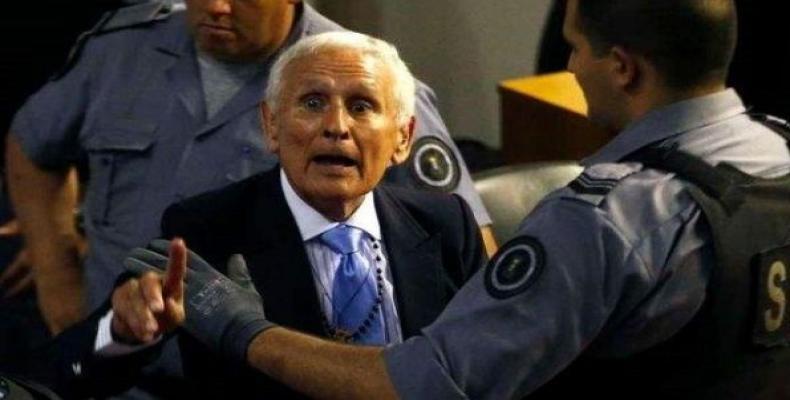Buenos Aires, December 29 (RHC)-- Miguel Etchecolatz, a former senior police officer during the U.S. backed Dirty War in Argentina in the 1970’s and 80’s, has been granted house arrest. The 88-year old, convicted in 1986 for six separate cases of “crimes against humanity,” including three life sentences, was granted the order by judges Jose Martínez Sobrino, Julio Luis Panelo and Fernando Canero. He was granted the motion because of his various physical ailments, as well as his age. Etchecolatz’s wife will be allowed to take care of him, while he will be surveilled through an electronic monitoring device in a home in the city of Mar de la Plata.
The former officer was the head of the Bueno Aires police in the first years of the military dictatorship and had been in charge of 21 clandestine detention centers.
Etchecolatz’s daughter was so ashamed of her father's crimes that she changed her last name. Known now only as Mariana D., she is a part of a group called “Disobedient Stories,” which was formed to publicly recount what life was like growing up alongside fathers who committed human rights abuses against dissidents in the country.
Official records state that some 7,600 people were either killed or disappeared during Argentina's Dirty War years. However, human rights activists argue that upwards of 30,000 people were killed or disappeared. It has also been reported that some 500 newborns to political prisoners were kidnapped by the military junta and raised by surrogate families.
Former Officer During Argentina’s Dictatorship, Granted House Arrest

Related Articles
Commentaries
MAKE A COMMENT
All fields required
Now Playing
24 Horas en el mundo
Next Program
- Desde Mi Habana
- La Trova Cubana
- Un lugar para la poesía
More Views
- U.S. healthcare cuts spark nationwide protests
- Israel's hawkish minister, husband accused of sexual abuse by daughter
- U.S. Colonel suspended for opposing Trump's military threat against Greenland
- IX CELAC Summit concludes with the signing of the Tegucigalpa Declaration
- U.S. immigration judge rules Columbia University activist Mahmoud Khalil can be deported

